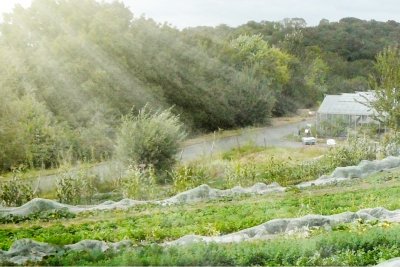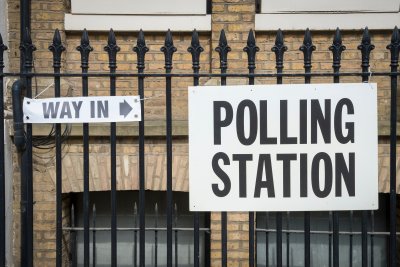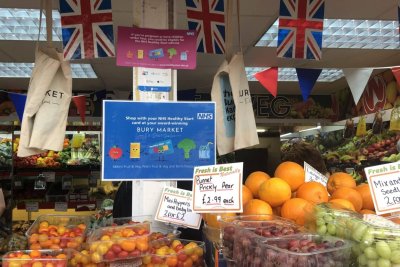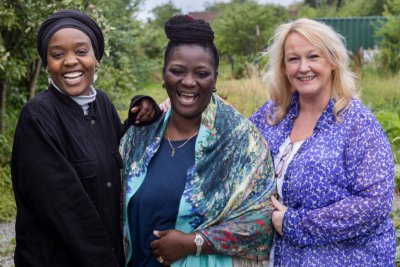The Sustain alliance’s role in helping to eradicate food poverty and hunger
Sustain chief executive Kath Dalmeny looks at what we can do, working in alliance, to eliminate food poverty and hunger in the UK. We have been reviewing our shared priorities in preparation for Sustain’s refreshed strategy for 2020 to 2025.
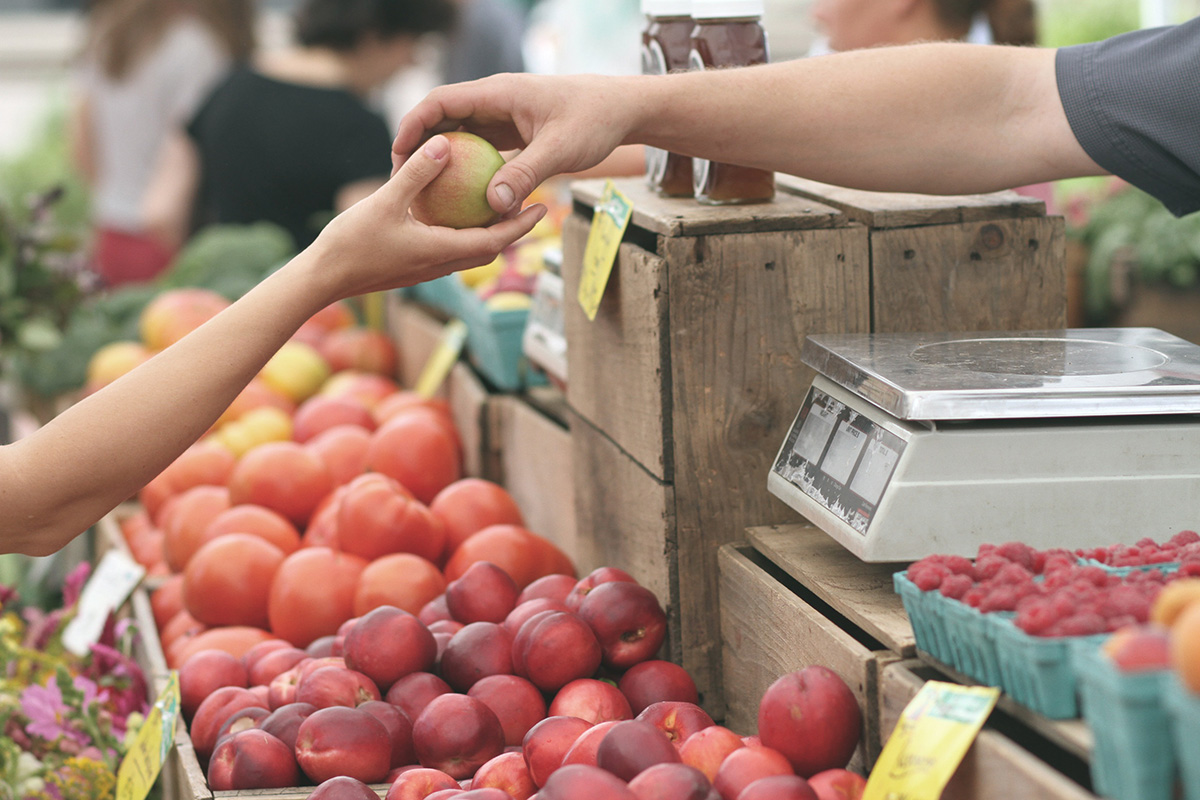
In the UK, over 8 million people in the UK struggle to get enough to eat. This includes many households with people in work, families with children, as well as people who are older or living with disabilities, and people who are destitute. We think that this situation is unacceptable and that the remedies are eminently achievable, given the right political will, public support and allocation of resources.
Food poverty, or household food insecurity, can be triggered by a crisis in finance or personal circumstances, but may also be a long-term experience of not being able to afford to eat well. Behind every emergency food parcel there is a story of personal crisis and avoidable food insecurity, directly affecting people’s health and well-being.
Worryingly, much of the alarming rise in need for emergency food banks (approximately 3 million emergency food parcels distributed last year in the UK, according to the two main networks of food banks) has come as a result of policies that perpetuate low wages, sanction benefit payments or force people to wait at least five weeks to receive financial support and then have to pay back loans to cover the shortfall. And it is sobering to note that the shocking number of people needing to seek emergency food aid is just a small proportion of those who experience food poverty across the UK.
Find out more about the Sustain alliance's work on food poverty and the Right to Food by following these links.
Action on many fronts
To address food poverty, a wide range of people and organisations have adopted different roles, from responding to household emergency; providing emergency food parcels or meals; distributing food to frontline charities that support or house vulnerable people; cooking fresh meals to help people live well and overcome social isolation; providing free school meals and breakfast clubs; providing meals on wheels for vulnerable people; improving standards for food served in care settings and hospitals; through to organisations focused on winning policies that would provide adequate support for necessary services and decent household incomes.
There has recently also been a welcome shift in emphasis among food aid organisations - leading groups such as Trussell Trust and the Independent Food Aid Network seeking to end the need for food banks rather than support charitable food banks becoming the institutionalised response to hunger.
Sustain is clear that in a fair society, there would be no need for food aid and emergency food banks. Whilst those that exist now are a compassionate response, often run by hard-pressed volunteers or low-income workers responding to unkind times, this way of feeding people is unviable and unjust in the longer term, and may contribute to further inequalities. Most organisations working on food, social justice and poverty now agree.
The purpose of the Sustain alliance is to bring people and organisations together to campaign for systemic change, either at local or national level. So, whilst acknowledging the limitations of step-by-step progress made within a broken system - and the challenge for too many people and services of having to run fast even to stand still in the face of cutbacks and austerity - Sustain is working together to achieve specific changes for the benefit of disadvantaged communities. We support, for example:
Better household incomes
We recognise that food poverty is a symptom of poverty. Whilst the social security benefits system might not appear at first glance to be a food issue, Sustain supports measures to increase household incomes that can enable people to be able to buy their own food and feel more food secure. Indeed, failure to improve incomes undermines all other efforts to help people live and eat well, and for communities to build viable local food enterprises and economies. Hence, Sustain supports specialist poverty and social justice organisations - for example as a supporter of the End Hunger UK alliance - in their campaigns for adequate social security benefits; curbs on benefit delays and sanctions; plus promotion of adequate incomes so that working people on a low income can afford to eat well.
The Right to Food in UK law
Sustain’s determination grows to secure the Right to Food in UK law, which would trigger cross-departmental duties on public bodies to secure access to healthy and sustainably produced food for everyone. The Labour Party, the Liberal Democrat Party, the Co-operative Party, the Green Party and the Scottish Government have now all committed to a Right to Food in UK law, as political support for this approach grows.
During 2019, the Government (under Conservative Party leadership and when Michael Gove MP was Secretary of State for Defra) supported development of recommendations for a National Food Strategy that could offer opportunities to address food poverty. We have lobbied the National Food Strategy team to say that it must. Recommendations are due in 2020, with the promise of an official government response in the form of a White Paper.
[Note: This article was published during the run-up to the 2019 General Election, so political commitments outlined above are likely to be subject to change. We will update this page when we know more.]
In addition, Sustain has been trying to persuade government to take responsibility for food supplies in a major crisis. The possibility of a no-deal Brexit has been the catalyst for this advocacy work. Our research indicates that a no-deal Brexit would have a strong likelihood of affecting people on a low income adversely. However, our concerns now also relate to what would happen if any major crisis affected our nation’s food supply. We think local and national resilience planning is, so far, inadequate to address such vulnerability.
Throughout 2019, Sustain tried strenuously to get government to promise a hardship fund for vulnerable people in the event of a no-deal Brexit, to help them as individuals, or the institutions that look after them (e.g. care homes, shelters), to buy the food they need. We have been lobbying government to acknowledge food poverty in no-deal Brexit contingency planning, recommending allocated funds and a clear process for cash grants direct to individuals and frontline charities to buy the food they need if supplies are seriously disrupted. However, shockingly, government says it has no duty to secure food supplies in a no-deal Brexit (nor any other crisis). And to our knowledge, no such hardship fund has yet been established.
Fiscal measures to address health inequalities and food poverty
Sustain’s campaign for a sugary drinks tax resulted in the Government introducing the Soft Drinks Industry Levy that now distributes £0.3bn per year for children’s health promotion, such as school breakfast clubs and holiday hunger programmes. We would like to explore more ways to shift significant resources into tackling the causes of food poverty and health inequalities, and away from supporting promotion of food and drink that causes ill health.
Action by local authorities that looks 'beyond the food bank'
Sustain works with local authorities to help them adopt specific measures focusing ‘beyond the food bank’ that are within the powers and gift of local authorities to implement. In London, our network London Food Link works with local authorities, supporting action to, for example, provide free school meals, breakfast clubs and meals on wheels; tackle holiday hunger; promote Healthy Start vouchers; promote the real Living Wage; and reduce the burden of Council Tax.
Sustain also works with food partnerships in towns, cities and rural areas around the UK as part of the Sustainable Food Cities and Food Power programmes to help local food partnerships adopt a similar approach, and also to support coordinated national campaigns, such as for greater promotion of Healthy Start fruit, vegetable and milk vouchers for pregnant women and young children in low-income households.
Better public sector food for vulnerable people
Sustain and our alliance members help improve public sector food standards: schools, hospitals, care homes, prisons and other public settings, many serving very vulnerable people and providing a significant proportion or all of the food they eat in a day. We have helped secure, for example:
- School Food Standards, now written into law;
- Universal Infant Free School meals, rescued from the political axe (and we continue to campaign for universal free school meals);
- Hospital food standards, now set as a requirement of the NHS Standard Contract;
- Government Buying Standards, covering prisons, armed forces, government departments, etc.;
- And we also contributed to development of the Food for Life Served Here voluntary standard that is helping to improve food and food culture in schools, hospitals and other settings.
More progress needs to be made with implementation of public sector food standards. And some institutions, such as state-funded nursery schools and care homes have some examples of good practice but only voluntary standards and no strong mechanism for improving the food for very young children, nor for older or vulnerable people in care settings or in receipt of meals on wheels services.
Healthier food for everyone
Sustain also campaigns for improvements in the healthiness of our food, food labelling and food marketing – supporting more fruit and vegetables and wholegrain foods, and less food that is high in fat, salt or sugar. This work is reported on our Children’s Food Campaign website and elsewhere, and is integral to our Sugar Smart and Veg Cities campaigns.
Accountability for those who need to take action on food poverty
Sustain was part of the team that won a commitment from national government to measure household food insecurity; and a commitment from the Mayor of London to do so too – the latter having already produced its first shocking figures that are making the case for determined action in London. Sustain sits on the London Food Board to encourage leadership on this issue by the Greater London Authority and by London’s 33 borough councils.
Measurement in itself does not achieve change, but it is a first step towards planning and designing services, and ensuring accountability, for those who need to take action. Effective accountability is a key reason why Sustain supports realisation of a Right to Food in UK law (see above).
Good food standards in food aid
Sustain has recently been challenged on why we do not campaign directly on food standards for organisations that supply food aid, or who distribute food to frontline groups in this sector. Sustain agrees with the principle that food provided via food aid needed in the here and now should be
- Safe, within use-by date, fresh, nutritious and of high quality
- Ensure that people with special dietary requirements or allergies can feel confident and safe to eat the food provided
And also, wherever possible:
- Favour fresh fruit and vegetables, wholegrain foods, pulses, and healthy meat and dairy options (and meat and dairy alternatives)
- Minimise or exclude less healthy packaged foods, unhealthy snacks, packaged desserts and sugary drinks
- Be flexible to the different needs of people from different age groups, cultures and dietary preferences
- Consider offering other goods such as toiletries and sanitary products, to reduce everyday household costs
- Link food aid recipients with services such as emergency grants, benefits advice and/or debt support, to help people overcome crisis and get on a more secure footing
Such considerations may necessitate the training of food aid staff and volunteers in skills for food safety, food handling and perishable food stock management; especially in relation to fresh and higher risk produce. It may also require the availability and use of refrigeration and food preparation facilities.
We recognise that meeting such standards could be challenging for community groups run by volunteers and food aid groups, on low or zero budget, sometimes in temporary, limited or occasional-use premises that may not have suitable facilities, receiving unpredictable supplies of donated food – either from individuals, from food companies, or from a surplus distribution service. Some places and local communities do manage to do so, and we commend them for this; whilst also recognising that developing infrastructure to provide better food aid should not impact on the ultimate goal, which is to eradicate the need for charitable food aid.
We warmly encourage food aid providers to make every effort to ensure that food meets the high standards that their clients deserve. However, we recognise that there is little mechanism by which these could be required, beyond an encouragement for standards to be adopted on a voluntary basis. So we promote inspiring examples of where this has been achieved, to help local areas adopt better practices, but do not actively campaign on this issue at this time.
As an alliance, Sustain will continue to recognise the value of emergency food aid food banks as a temporary response to unacceptable levels of food crisis, and we honour the compassionate people – often local volunteers – who respond in this way.
However, Sustain will work with others to campaign against the institutionalisation of food aid, on the basis that food crisis is preventable and that permanent solutions are achievable, given the right political will, public support and allocation of resources.
Published Friday 6 December 2019
Food Poverty: Millions of people in the UK struggle to get enough to eat. We’re working to change that through people-powered projects and campaigns that tackle the root causes of food poverty and ensure everyone has dignified access to healthy, affordable food.
